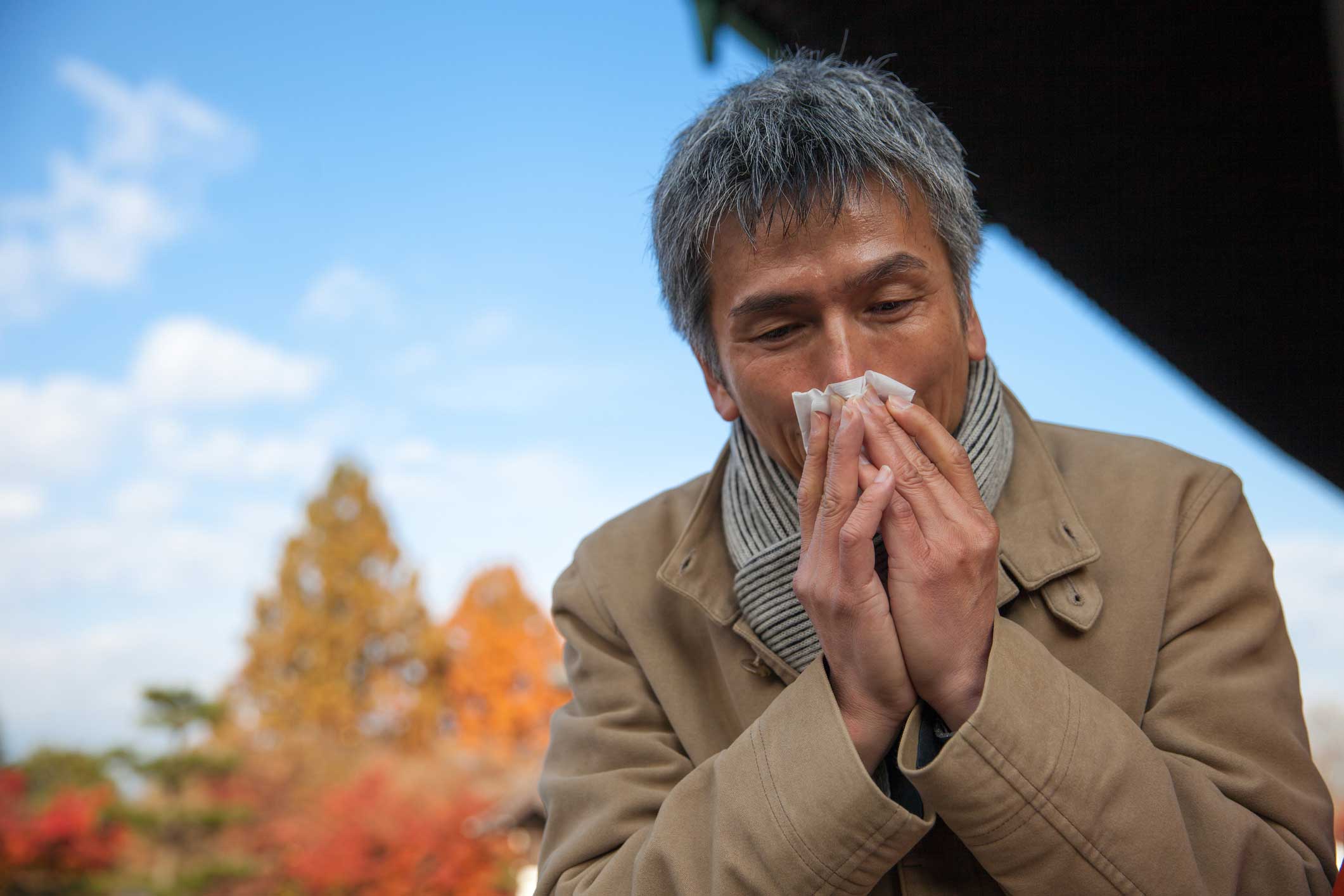<< Back
The Question for Fall: Is it a Cold or Allergies?

September 30, 2019
Are your eyes watering yet? If you have seasonal allergies, you already know the fall season is officially here.
Ragweed pollen is an allergy trigger that arrives in Connecticut each spring and lasts until late September, sometimes into October depending on the previous winter’s weather.
“It seems as if there has been an increase in viral upper respiratory illnesses,” says Dr. Jason Kurtzman of Hartford HealthCare-GoHealth Urgent Care, “but that’s expected this time of year.”
Ragweed, the rogue plant that infiltrates our gardens and boundaries each year, is best known as a menace to allergy sufferers. A single ragweed plant can produce more than 1 billion grains of pollen each season. Ragweed is responsible for an estimated 100 million tons of pollen in the United States each year.
Outdoor mold, another allergy trigger, peaks in July through late summer yet persists in fall by growing on fallen leaves, soil and compost piles. Mold also thrives indoors in humid conditions. For many Connecticut homeowners, that makes a basement humidifier mandatory in the summer and early fall. But mold spores can also thrive in the dampness of a bathroom or kitchen sink area.
Most people know the symptoms as hay fever — sneezing, stuffy nose, sinus pressure, watery eyes and itchy eyes, nose and even roof of the mouth — but the medical term is allergic rhinitis. Besides ragweed and mold spores, triggers include pollens from trees, grasses and other weeds. It’s not just pollen from local plants. Once airborne, pollen can travel hundreds of miles. (Greetings, Ohio allergens!) Some people are also sensitive to dust mites, which populate the house in the humid summer before getting whipped into the air when you turn on the heat for the first time in the fall.
More than 50 million Americans deal with seasonal allergies each year, says the Centers for Disease Control and Prevention, making it the leading cause of chronic illness in the United States. In the past 12 months, estimates the CDC, 16 million adults have been diagnosed with hay fever.
For sheer allergy agony, Connecticut pushed ever higher in the Asthma and Allergy Foundation of America’s Allergy Capitals 2018 survey of the 100 “most challenging places to live with spring allergies.” New Haven ranked 24th, up from 57th in 2016. The Hartford metropolitan area, at No. 26, moved up from 56th. Providence, meanwhile, is now the nation’s sixth most challenging place to live with spring allergies. (The foundation does not compile ratings for fall allergies.)
The sneezing, runny nose, congestion and itchy, watery eyes are more than an inconvenience. Sometimes allergy sufferers don’t know whether they’re suffering from seasonal allergies, a nasty cold or even asthma that might require a doctor’s attention. Unfortunately, your immune system isn’t doesn’t know, either. Your body can’t distinguish an actual infection from a cold and the symptoms caused by harmless pollen or mold. It treats inflammation in the nose and sinus the same: It releases cytokines to counteract an infection, even if one doesn’t exist.
In some cases, cytokines’ interaction with the nervous system and brain can affect a person’s mood. Lack of clarity, or brain fog, is an unmeasurable but common reaction, say allergy sufferers.
“As far as telling the difference between allergy and virus,” says Dr. Kurtzman, “it’s often hard due to overlap of symptoms. If the primary symptoms are itchy eyes, nasal congestion, postnasal drip, that is more likely allergy. If there is also fatigue or low-grade fever I’m more likely to say virus. Both can have sore throat and cough, but again I’m more likely to link those to viral illnesses. Ultimately, we treat both very similarly.”
An allergist can determine exactly what causes your allergy symptoms by exposing your skin to specific allergens, pricking it, then checking for a reaction such as a small, itchy bump. That kind of reaction means you’re allergic. A blood test also might help. Allergen immunotherapy, commonly known as allergy shots, then can provide relief for many people without medication. The shots contain a small amount of a specific allergen to stimulate your immune system without causing an actual itchy-watery-congested reaction.
Help yourself by:
- Showering at night so you don’t bring pollen picked up during the day into your bed.
- Knowing when pollen is at its highest levels: check your favorite pollen-tracker app or
- Close windows in the home and car on days with high pollen counts.
- Start taking your medication, whether prescription or over-the-counter, before the allergy season starts.
- Clean your pets frequently: They’re carriers of dander, pollen (if they go outside) and other allergens.
- Do not dry your clothes outdoors.
- Remove decaying leaves from gutters and around the yard.
If you think you’re suffering from seasonal allergies, consult your primary care physician. To find a primary care physician near you or to schedule an appointment, please call the Hartford HealthCare Medical Group at 877.707.4442. To find a Hartford HealthCare-GoHealth Urgent Care center near you, click here.